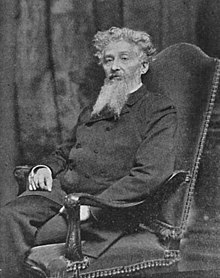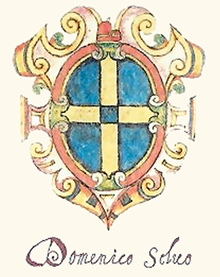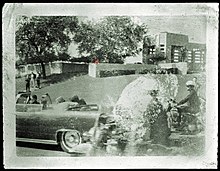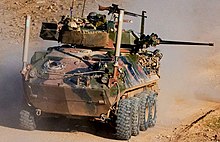Portal:History
The History Portal
History (derived from Ancient Greek ἱστορία (historía) 'inquiry; knowledge acquired by investigation') is the systematic study and documentation of the human past. History is an academic discipline which uses a narrative to describe, examine, question, and analyse past events, and investigate their patterns of cause and effect. Historians debate which narrative best explains an event, as well as the significance of different causes and effects. Historians debate the nature of history as an end in itself, and its usefulness in giving perspective on the problems of the present.
The period of events before the invention of writing systems is considered prehistory. "History" is an umbrella term comprising past events as well as the memory, discovery, collection, organization, presentation, and interpretation of these events. Historians seek knowledge of the past using historical sources such as written documents, oral accounts or traditional oral histories, art and material artefacts, and ecological markers.
Stories common to a particular culture, but not supported by external sources (such as the tales surrounding King Arthur), are usually classified as cultural heritage or legends. History differs from myth in that it is supported by verifiable evidence. However, ancient cultural influences have helped create variant interpretations of the nature of history, which have evolved over the centuries and continue to change today. The modern study of history is wide-ranging, and includes the study of specific regions and certain topical or thematic elements of historical investigation. History is taught as a part of primary and secondary education, and the academic study of history is a major discipline in universities.
Herodotus, a 5th-century BCE Greek historian, is often considered the "father of history", as one of the first historians in the Western tradition, though he has been criticized as the "father of lies". Along with his contemporary Thucydides, he helped form the foundations for the modern study of past events and societies. Their works continue to be read today, and the gap between the culture-focused Herodotus and the military-focused Thucydides remains a point of contention or approach in modern historical writing. In East Asia a state chronicle, the Spring and Autumn Annals, was reputed to date from as early as 722 BCE, though only 2nd-century BCE texts have survived. The title "father of history" has also been attributed, in their respective societies, to Sima Qian, Ibn Khaldun, and Kenneth Dike. (Full article...)
Featured picture
Did you know (auto generated)

- ... that the Oxtongue River, historically a canoe route for indigenous people, is still used for recreational canoeing?
- ... that during the first tour to the Soviet Union by any American ballet company, Lupe Serrano danced the first encore in the American Ballet Theatre's history?
- ... that archaeological excavations in the historic town of Kharayeb revealed a rural settlement with a complex system of cisterns and a Phoenician temple?
- ... that the 1948 novel The Corner That Held Them uses subversion of history that includes a nun who enjoyed the Black Death?
- ... that Maggio di Accettura, a festival in Italy dedicated to the Christian martyr Saint Julian, might have pagan origins or be linked to Langobard history?
- ... that American Colossus is a biography of a man who was "the most famous sportsman in the world" and "the most forgotten great athlete in American history"?

Ramón Emeterio Betances y Alacán (April 8, 1827 – September 16, 1898) was a Puerto Rican independence advocate and medical doctor. He was the primary instigator of the Grito de Lares revolt and designer of the Grito de Lares flag. Since the Grito galvanized a burgeoning nationalist movement among Puerto Ricans, Betances is also considered to be the father of the Puerto Rican independence movement and the El Padre de la Patria (The Father of the Homeland). His charitable deeds for people in need, earned him the moniker of El Padre de los Pobres (The Father of the Poor).
Betances was also a medical doctor and surgeon in Puerto Rico, and one of its first social hygienists. He had established a successful surgery and ophthalmology practice. Betances was also an abolitionist, diplomat, public health administrator, poet, and novelist. He served as representative and contact for Cuba and the Dominican Republic in Paris. (Full article...)
On this day
- 537 – The reconstructed Hagia Sophia in Constantinople was inaugurated; built as a church, it later became a mosque and a museum.
- 1831 – HMS Beagle departed Plymouth, England, on a voyage to South America that established Charles Darwin (pictured) as a naturalist.
- 1939 – A magnitude 7.8 earthquake struck central Turkey, destroying 90 per cent of the buildings in the area, and causing over 32,000 deaths.
- 1979 – Soviet–Afghan War: Soviet troops stormed Tajbeg Palace outside Kabul and killed Afghan president Hafizullah Amin and his 100–150 elite guards.
- 2007 – Former prime minister Benazir Bhutto was assassinated while leaving a Pakistan People's Party political rally at Liaqat National Bagh in Rawalpindi.
- Prince Rupert of the Rhine (b. 1619)
- Agda Meyerson (d. 1924)
- Chyna (b. 1969)
- Amy Vanderbilt (d. 1974)
Selected quote
Fortune, which has a great deal of power in other matters but especially in war, can bring about great changes in a situation through very slight forces.
— Julius Caesar, Roman consul
Related portals
More Did you know...
- ... that the Japanese aircraft carrier Amagi (wreck pictured) capsized on 29 July 1945 as a result of cumulative damage inflicted by American airstrikes on 24 and 28 July?
- ... that Scandinavian influence in Scotland, still evident today, was probably at its height during the time of Thorfinn the Mighty?
- ... that, after the 2003 invasion of Iraq, the Bassetki statue, which is more than 4,200 years old, was found in a cesspool?
- ... that in medieval art, angels were often depicted wearing feather tights?
- ... that 49% of German military losses happened in the last 10 months of the Second World War in Europe?
- ... that Joshua L. Goldberg, the first rabbi to serve as a World War II U.S. navy chaplain, was a Russian army deserter?
- ... that Richard Nixon chose the Wilson desk as his Oval Office desk because he believed it was used by Woodrow Wilson, informed that it was used by Henry Wilson, Vice President under Ulysses S. Grant, but actually bought by Garret Augustus Hobart, 24th Vice President of the United States under President William McKinley?
- ... that some of the nominally silver Roman coins from the Bredon Hill Hoard only have a 1% silver content?
Topics
Categories

History • By period • By region • By topic • By ethnic group • Historiography • Archaeology • Books • Maps • Images • Magazines • Organizations • Fictional • Museums • Pseudohistory • Stubs • Timelines • Chronology • People • Wikipedia historians
WikiProjects
![]() WikiProject History •
Ancient Near East • Australian History • Classical Greece and Rome • Dacia • Former countries • History of Canada • Chinese history • European history • Heraldry and vexillology • Indian history • Jewish history • Medieval Scotland • Mesoamerica • Military history • Middle Ages • History of Science
WikiProject History •
Ancient Near East • Australian History • Classical Greece and Rome • Dacia • Former countries • History of Canada • Chinese history • European history • Heraldry and vexillology • Indian history • Jewish history • Medieval Scotland • Mesoamerica • Military history • Middle Ages • History of Science
WikiProject Time • Days of the Year • Years
WikiProject Biography • Composers • Political figures • Saints • United States Presidents
Things you can do
 |
Here are some tasks awaiting attention:
|
Associated Wikimedia
The following Wikimedia Foundation sister projects provide more on this subject:
-
Commons
Free media repository -
Wikibooks
Free textbooks and manuals -
Wikidata
Free knowledge base -
Wikinews
Free-content news -
Wikiquote
Collection of quotations -
Wikisource
Free-content library -
Wikiversity
Free learning tools -
Wiktionary
Dictionary and thesaurus






















































